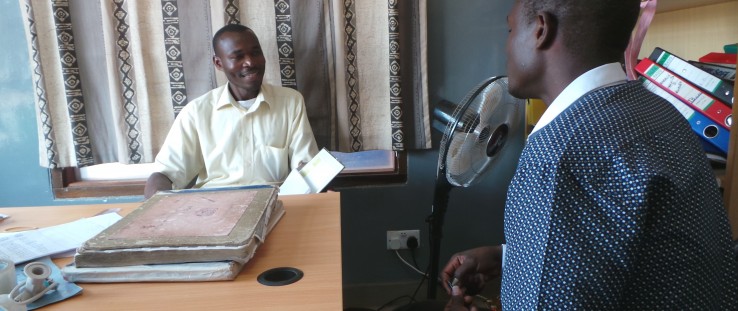 Misozi Banda, a linkage expert for Salima District Hospital, left, reviews referrals for the day with community health worker Martin Banda.
Robbie Flick
Misozi Banda, a linkage expert for Salima District Hospital, left, reviews referrals for the day with community health worker Martin Banda.
Robbie Flick
 Misozi Banda, a linkage expert for Salima District Hospital, left, reviews referrals for the day with community health worker Martin Banda.
Robbie Flick
Misozi Banda, a linkage expert for Salima District Hospital, left, reviews referrals for the day with community health worker Martin Banda.
Robbie Flick
HIV almost killed Rose Mateyu.* “After [my HIV] diagnosis,” she recalls, “I was advised to come back after two days to start antiretroviral therapy.” But, like many other patients, she did not come back.
“It was like I had a tag on my forehead pronouncing my status. I stayed away for fear of being labeled HIV-positive in my community,” she said.
When diagnosed in 2010, Mateyu was 75 years old. Five years later, when she returned to Malawi’s Khombedza Health Center, she was dangerously ill and suffering from recurrent fevers, frequent headaches and skin problems. She was retested, counseled and advised to begin treatment, but this time with one key addition: a linkage expert.
The Linkage Expert Initiative is a component of the Tingathe project in Malawi that works to curb the HIV/AIDS epidemic using a cadre of health experts dedicated to providing one-on-one counseling and services to patients with HIV, including tracking and escorting clients. Funded by the President’s Emergency Plan for AIDS Relief through USAID, the initiative is implemented by the Baylor College of Medicine Children’s Foundation–Malawi.
George Fashoni is one such linkage expert, who is at the center of the fight against HIV. He says he is proud of his job and that health promotion is his passion. Fashoni visits clients in their homes, bringing testing, counseling and referral services. He ensures that his clients know what services are available at the health center and how to access them—often escorting them himself, if needed. He encourages spouses and children of clients to get tested, and works closely with local health center staff to ensure patients come back for their appointments and stay on their medications.
The Linkage Expert Initiative began in July 2015 at two sites in Malawi, and has grown to include eight other central zone sites. There are over 100 community health workers trained in linkage expert responsibilities, with 10 focal experts supporting sites in Malawi. Experts receive community health worker training that covers HIV treatment and counseling, basic monitoring and evaluation skills, and patient flow through HIV clinics.
Malawi’s HIV prevalence is one of the highest in the world, with 10.3 percent of the population ages 15-49 infected. Currently, the number of individuals living with HIV in Malawi represents 4 percent of the total HIV burden in sub-Saharan Africa. While these numbers reflect a significant improvement over a decade ago, there is still a lot of work to be done.
Linkage experts ensure that no one diagnosed with HIV leaves the health facilities without knowing the services available to them, and where they can go to get the information and counseling they need to begin treatment and practice prevention. By filling the gap between diagnosis and linkage to care, and by providing education and counseling to individuals living with HIV, the experts are playing an important role in reducing the number of new HIV infections.
In 2014, four years after Mateyu’s diagnosis and a few months before Fashoni took on his role as a linkage expert, the United Nations announced the “90-90-90” by 2020 plan. The plan calls for 90 percent of all people living with HIV globally to know their HIV status, 90 percent of all people diagnosed with HIV to receive antiretroviral therapy, and 90 percent of those on antiretroviral therapy to achieve viral suppression. Viral suppression occurs when the level of virus in a person’s blood becomes undetectable. The person is not cured, but is less likely to transmit the virus to others. USAID supports the 90-90-90 initiative through its endorsement and development of a variety of programs like the Tingathe project.
Antiretroviral drugs taken daily can extend the life expectancy of a person living with HIV to that of the general population. As in Mateyu’s case, HIV unchecked can lead to life-threatening illness within a few years.
Mateyu was reluctant at first to start her treatment after being diagnosed the second time. As a local chief in her community, she feared the stigma and discrimination that affects so many others living with HIV.
During her visit with Fashoni, he counselled her on the benefits of treatment and the inherent confidentiality that accompanies it. By encouraging Mateyu to be a positive role model for others living with HIV in her community, Fashoni was able to get her to start her treatment. Now, instead of living in fear, Mateyu proudly works to support others in her community also affected by HIV.
Mateyu is no longer sick. With the support of a linkage expert, she takes medications daily to control the ill effects of HIV and attends scheduled appointments. She recently celebrated her 80th birthday and, with her regained strength, keeps a vegetable garden. She grows more than she can eat, so she sells the rest at her local market. On a sunny day, and there are many such days in Malawi, you’ll find her in her garden or selling fresh produce at a nearby market.
“I didn’t see the value of life until now,” she says.
As for Fashoni, he’s just happy to do his job. “I was born to take care of those who are in need of help,” he recently said. Ask him what he thinks about the Tingathe program and he’ll tell you, “I love working with Tingathe, for Tingathe’s goal is what is embedded in me.” As for curbing the HIV epidemic in Malawi, Fashoni says, “We are surely making strides.”
*Real name withheld to protect identity.
Jen Boyle, Steffanie Wright, B. Ryan Phelps, Katie Simon, Rachael Sabelli, Charity Kubalasa-Ndeule and Saeed Ahmed contributed to this article.
Related Links








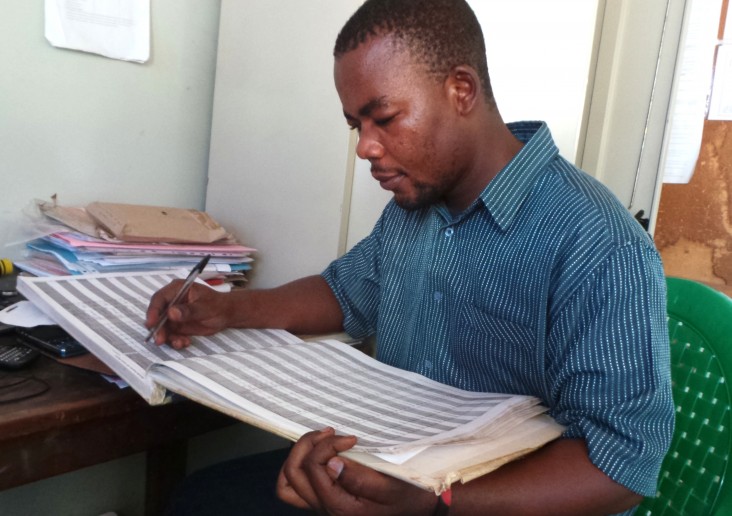
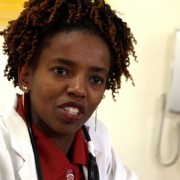
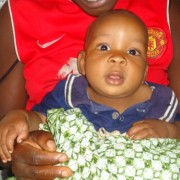
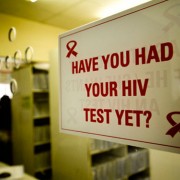
Comment
Make a general inquiry or suggest an improvement.